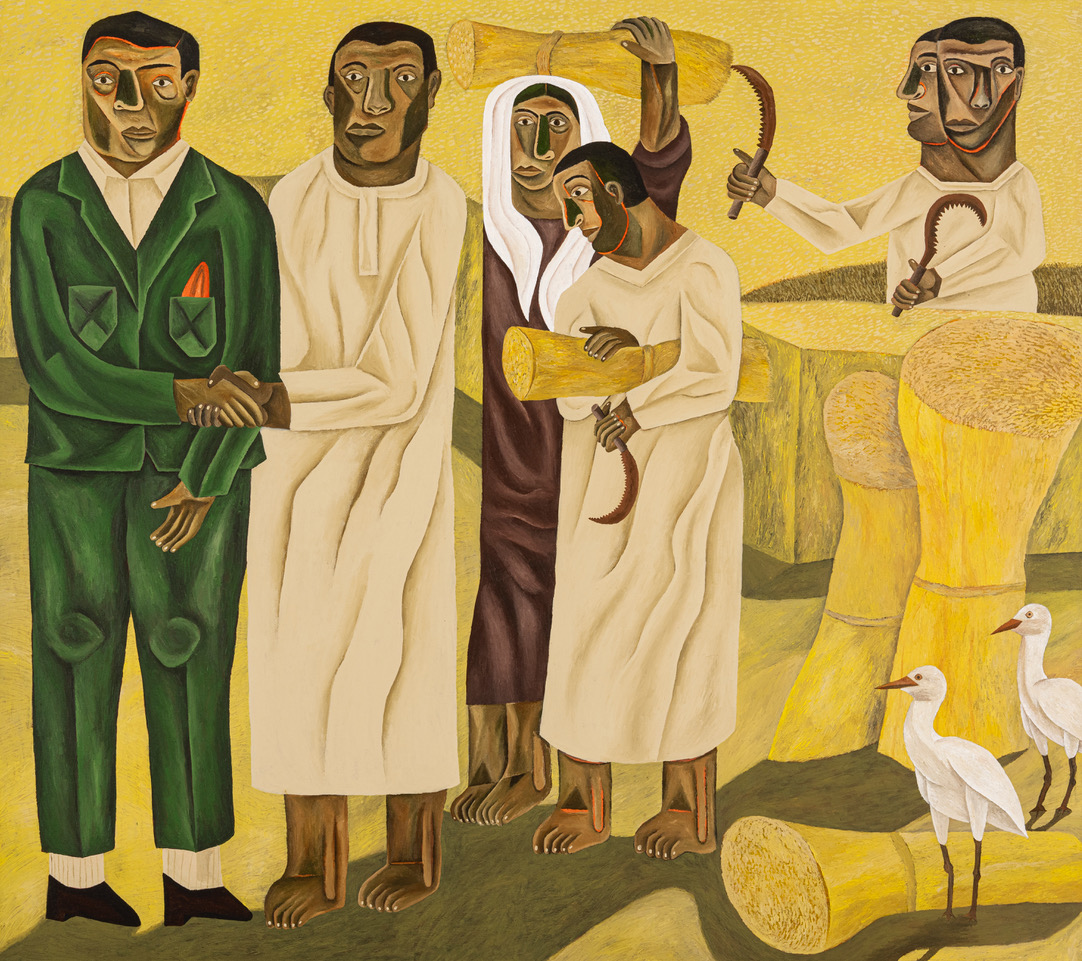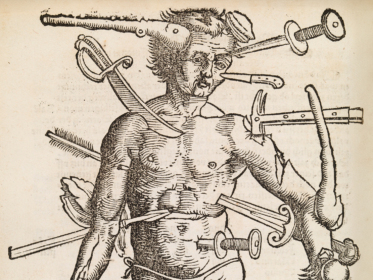Two Years of War in Sudan
Translated by Julia Bosson

Six years ago, a revolutionary movement toppled the 30-year regime of Omar al-Bashir in Sudan. In the months that followed, a wide range of forces debated how the “new Sudan” should be governed — trade unions, neighborhood resistance committees, and even the military, which had played a role in al-Bashir’s downfall. Two years later, the same military staged a coup against the newly formed transitional government, together with the paramilitary Rapid Support Forces (RSF). And two years after that, these two forces — the military on one side and the RSF on the other — went to war against each other. Overnight, Khartoum became the central theater of the war, and since then, fighting has spread to almost the entire country.
This war has been underway for more than two years now, and the people of Sudan are facing the largest refugee, health, and hunger crises in the world. More than 12.5 million people have been displaced, and more than 25 million are at risk of starvation. Attacks on civilians, displaced-person camps, hospitals, and schools are frequent, as are instances of sexual violence as a tactic of war — but the exact extent is difficult to ascertain because almost no aid organizations or human rights missions remain in the country.
Over the course of the conflict, it has become clear how much can go wrong in the international response to political events in Africa. The media in Germany is stuck in a pattern of erratic and superficial reporting, and political and activist circles have struggled to situate this war in their analysis. Too often, Sudan plays only a minor role in activist dialogues or is used as a token to pit political movements against each other. So how do we move toward a better, more solidarity-based engagement with Sudan?
Who does the forgetting?
By almost every measure, Sudan is currently experiencing the world’s greatest crisis. And although the war has made headlines in German-speaking countries, the framing seems to be fixed — it’s about hunger, “tribal conflicts,” or “ethnic violence.” The crisis seems to be the result of fate. This is a portrayal of Africa that has long been criticized by scholars and activists, not least twenty years ago by Kenyan author Binyavanga Wainaina: people and events on the continent are portrayed as pure victims, depoliticized, powerless, decontextualized, and without history.
In the Süddeutsche Zeitung, an article about Sudan is titled Hungerland, and the cover photo shows an emaciated child gazing into the camera with big brown eyes, serious and sad. The Tagesschau news program begins its report on the war with a sentence that seems to confirm every single point in Wainaina’s satirical How to Write About Africa: “The wind […] whips up desert sand, […] a tiny baby blinks in the glaring sun.”
And then, again and again, the forgetting. The forgotten war. The forgotten ones. The world looks away. The greatest forgotten war of our time. This is how ARTE, Die Zeit, Der Spiegel, Tagesschau, and others have titled sporadic reports on the situation in the country in recent years.
But in German media, the story of a society organizing and caring for itself under war conditions remains untold.
But who is actually doing the forgetting? What we know, what we read and hear, determines who or what is being forgotten. So it leaves a bitter taste when the very media outlets that have a concrete influence on what is remembered and what is forgotten choose “forgetting” as a hook for their own lack of coverage.
Instead of forgetting, the media could choose to explain how the war is really a counterrevolutionary development directed primarily against the Sudanese public, which for months not only protested al-Bashir but also opposed further military involvement in the “new” Sudan. Or they could report on the people who, despite everything, have been carrying on for years: the “emergency response rooms,” which grew out of the neighborhood resistance committees active during the revolution and have been doing the work that the warring parties and international organizations have failed to do since the war began: rationing food donations, organizing shelters, and converting abandoned buildings into improvised hospitals, emergency kitchens, and learning centers. But in German media, the story of a society organizing and caring for itself under war conditions remains untold.
Eyes on Sudan
The #KeepEyesOnSudan campaign originated in the Sudanese diaspora as a reaction to the western media’s failure to cover the conflict and as a call to political movements around the world.
Even among those whose worldview extends beyond traditional media, those who are engaged with issues such as Palestine or Ukraine, Sudan rarely features — it is absent from political debates, postcolonial analyses, and calls for protest. Why is that? How is it that when it comes to other conflicts people feel compelled to take action, educate themselves, learn about geography and history, and name perpetrators and accomplices — but many could not even locate Khartoum on a map?
Is it simply a case of forgetting? Is it anti-Black racism that causes the “left-wing” German public to demonstrate no interest in or connection to Sudan? Is it the attention economy, in which cases of suffering and war must always compete with one another? Is Sudan simply too low in the “hierarchy of solidarity,” as Sinthujan Varatharajah and Moshtari Hilal coined this graded compassion?
It is easier to engage with Sudan rarely and superficially, sharing Instagram posts on anniversaries of the revolution and the start of the war.
All these factors likely apply in some way. Racist devaluation naturally plays a role in Sudan — both internally and externally, since the concept of “Sudanese-ness” itself is often based on an Arab-Muslim identity that was first constructed and maintained through Arabization campaigns, as a demarcation from “African-ness.” This distinction was reinforced by decades of colonial rule under the Ottoman Empire, Egypt, and Great Britain, as well as under al-Bashir in order to legitimize access to and exploitation of land, resources, and labor, especially in the west and south. The genocide in Darfur in the early 2000s was based on precisely this distinction and was carried out by the paramilitary Janjaweed, a kind of private army of the regime. The RSF is often seen as the successor to the Janjaweed, as they often fight along the same lines and in the same places.
Knowledge of this colonial history and of the relationship between the country’s center and the western and southern regions is essential to understand this war. This intricacy seems to make the conflict “too complicated” for international debate. It is easier to engage with Sudan rarely and superficially, sharing Instagram posts on anniversaries of the revolution and the start of the war.
Frustration on the part of Sudanese communities is understandable. All the more so from those not part of the Arab elite in the capital. It is a frustration that many other movements have known for too long. The eternal debate: Is Darfur more important than Khartoum? Palestine than Sudan? Or is Ukraine the most significant, after all?
Sudan has a particularly long history of being played off against other places, mostly for external purposes and foreign interests. During the Cold War, it was West Germany and Israel that alternately supported the south or the north of the country (in the case of Germany this took the form of massive arms deliveries that are still contributing to the militarization of the country).
During the genocide in Darfur, al-Bashir diverted attention from his own actions by telling activists and journalists to focus on dead children in Palestine rather than the situation in Sudan. Meanwhile, the “Save Darfur” campaign undertaken by American celebrities, which constructed the war as an example of “evil” Arabs against “good” Africans, fit perfectly into the racist and Islamophobic “War on Terror” of the 2000s.
Debates that perpetuate such narratives and hierarchies rarely operate in the interest of or out of solidarity with the actual people on the ground. So what remains? How can movements and individuals operate if they do not want to play into the competition for attention, or pit one conflict against another?
Diasporic Solidarity
A starting point could be to place more attention on the links between different contexts, precisely because of the unequal attention they receive. In other words, to build an analysis that is not only about one individual conflict or the German public, but focused on the connections between them.
Connections such as: the role of the United Arab Emirates. Sudanese journalists and scholars such as Nisrin Elamin and Husam Mahjoub have long been researching how the geopolitical and economic interests of the Gulf states are playing out in East Africa, and the UAE is one of the largest international forces in this war. Not only do they support the RSF, but they are also the primary destination for informal gold trading, which is used by all sides in the war to finance themselves.
Connections such as: the role of Russia, and the fact that Sudan has at times become an extension of the Ukraine war, due to the presence of Wagner Group troops to support the army. Connections such as racist isolationist policies in the West, which mean that there are hardly any emergency visas or admission programs in Europe, Canada, or the U.S. (where Sudanese nationals are now banned from entering anyway), just as it was the case for African students in Ukraine at the start of the war.
To think about Sudan in connection with other places and movements requires intersectional perspectives like these. This is especially true in Germany, where intimidation, marginalization, and repression tactics are rising and where solidarity, care, and empathy are basically unknown to the broader public.
Connections such as: the shared experience of people in Khartoum and Damascus, who may have experienced a similar sense of unease during the “liberation” of their cities — a sense that they might now be better off than before, but that this freedom is miles away from a secure, just, truly liberated future.
A strategic analysis that focuses, for example, on arms deliveries and production and asks who actually profits from all these wars. In England, Sudan protests target British arms deliveries to the UAE, forming alliances with protests targeting deliveries to Israel. (Incidentally, Dubai has also become a favorite destination for Israeli soldiers to vacation after their deployment, to put their participation in genocide out of mind while jet skiing.)
To think about Sudan in connection with other places and movements requires intersectional perspectives like these. This is especially true in Germany, where intimidation, marginalization, and repression tactics are rising and where solidarity, care, and empathy are basically unknown to the broader public. It is obvious that this approach will not eliminate all internal hierarchies and divisions. And yet, it is at least worth trying to change how we have dealt with, reported on, and politically engaged with the war in Sudan. And to come closer, at least in part, to what serious international solidarity would require.
